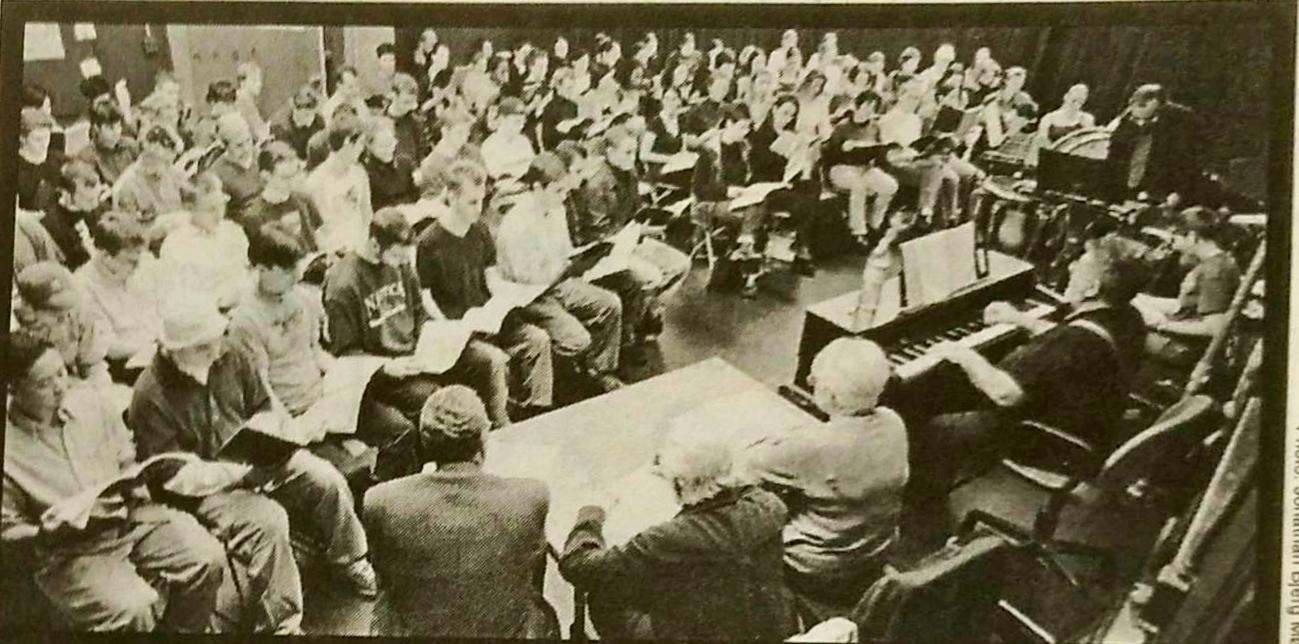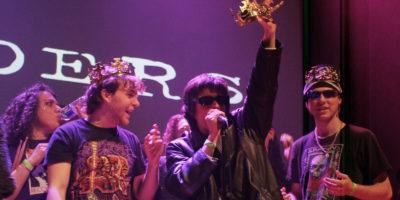By Garine Tcholakian
Writing music about the most atrocious crimes of the previous century is a challenge many would shirk in favour of lighter material.
Not composer David Walden. His awakening to the horrors of genocide put him the path to producing Requiem: In Remembrance of the Genocides of the 20th Century, which opens at the Ryerson theatre this Saturday.
“I want you to do this well, not for me but for the victims,” Walden tells his students during a rehearsal two weeks prior to the performance, which runs for one night only this Saturday.
Walden was inspired to compose the music Requiem 25 years ago, when his 11-year-old piano student helped the meaning of genocide. One evening, when he was visiting with the student’s family, the boy’s father offered David a copy of The Burning of Smyrna, an account of the Armenian massacres perpetrated by the Ottoman Turks in 1915. One appalling scene from the book was the image of 21 allied ships moored in the harbour of Smyrna as Armenians and Greeks were being driven into the sea of flames.
“I was almost 40, has a university degree, I had my Master’s degree, my PhD and I had never heard of the Armenian genocide,” Walden says. “I said, ‘ How can I be educated in the 20th century, and I’ve never heard of it?’
“It grew from there. I thought someday I would do something.”
Walden started to do research in 1994, when he learned of the fighting between the Hutus and Tutsis in the Rwandan genocide.
Walden’s readings led to days when he had to put the book down and go for a walk. He thought, “How do we communicate information in these books and affect people?”
As a composer, Walden is intimately aware of the power of music. His concept of evoking an ancient burial service (a Requiem, Latin for rest) to communicate his message as fitting as it is powerful. The result give the audience the experience of attending a mass burial service for the dead, and spectators connect with the emotions of genocide victims.
Dressed in sombre earth tones, as though rising from the dead, a choir of sopranos, tenors and altos sing the sorrow of millions of victims. Three soloists, an orchestral ensemble and more than 100 voices produce moving Latin hymns that are linked by narration that informs and inspires. “If that nations of the world, knowing what had happened to the Armenians, had done something about it, could the horror of the Holocaust and the entire Second World War been prevented?” a narrator asks in the opening scene.
Each of the narrators has a connection to the Ryerson community. Ruth Grier, one of the narrators, is an honorary doctorate holder at Ryerson and wife of former president Terry Grier. Another narrator, Dan McIntyre, is the chair of Ryerson’s of board of governors and former members of the Human Rights Commission.
“Requiem is designed as such so it’s an internal-to-Ryerson community production for a wider external community,” says Rob Haines, the 27-year-old producer of the show.
For the students who volunteer four to six hours a week rehearsal time — many of whom also rehearse another four hours on top of that — Requiem’s subject matter carries a worth beyond performance experience.
“Requiem makes the knowledge of these genocides accessible to a wider audience, because people can understand when it’s presented to them versus having to read about it or take a class,” says theatre student Shan Anderson, 21. “This is another way of bringing it to the forefront of their thinking.”
That is why proceeds for the show will go toward the creation of a scholarship for social justice, says Haines, who has been working on Requiem for the past 10 months.
“The origins of theatre come from telling stories of political change,” he says.
Haines believes informing people is the first step to influence change. The performance involves involves the audience by teaching them about other unknown genocides. One example of an unrecognized horror acknowledged in Requiem is that although most people know 66 per cent of the Jewish population was affected during the Second World War, many unaware that 90 per cent of Roma Gypsies were persecuted.
“My hope is that by the end of the evening, their consciousness will have been raised,” says Walden. “The people are made award in this global village must elect officials who will be concerned enough to help bring about a system of international injustice.”










Leave a Reply